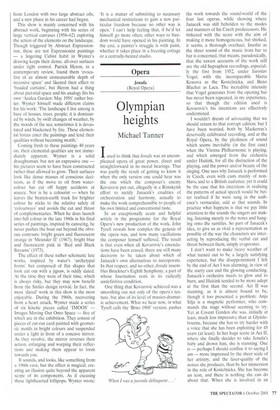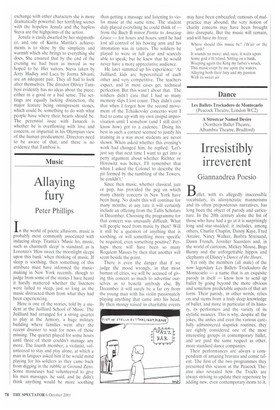Opera
Jenufa (Royal Opera)
Olympian heights
Michael Tanner
Iused to think that Jenufa was an uncomplicated opera of great power, direct and straightforward in its moral bearings. That was partly the result of getting to know it when the only version one could hear was the one which the composer's enemy Kovarovic put out, allegedly in a Rimskyish effort to rectify Janacek's crudities of orchestration and harmony, actually to make the work comprehensible to people of his own limited and conventional taste.
In an exceptionally acute and helpful article in the programme for the Royal Opera's new production of the work. John Tyrell reveals how complex the genesis of the opera was, and how many vacillations the composer himself suffered. The result is that even when all Kovarovic's emendations have been erased, there are still many decisions to be taken about which of Janacek's own alternatives to incorporate. In that respect, and no other, Jenufa resembles Bruckner's Eighth Symphony, a part of whose fascination rests in its radically undefinitive condition.
One thing that Kovarovic achieved was a smoothing out not only of the opera's texture, but also of its level of musico-dramatic achievement. What we hear now, in what Tyrell calls the 'Brno 1908' version. pushes the work towards the sound-world of the four last operas, while showing where Janacek was still beholden to the modes and manners of his Czech predecessors. He tinkered with the score with the aim of making it more homogeneous, but shirked, it seems, a thorough overhaul. Insofar as the sheer sound of the music from bar to bar is concerned, that means, paradoxically, that the rawest accounts of the work still are the old Supraphon recordings, especially the first from 1952, under Jaroslav Vogel, with the incomparable Marta Krasova as the Kostelnicka, and Beno Blachut as Laca. The incredible intensity that Vogel generates from the opening bar has never been repeated, in my experience, so that though the edition used is Kovarovic's his intentions are effectively undermined.
I wouldn't dream of advocating that we should return to that corrupt edition; but I have been worried, both by Mackerras's deservedly celebrated recording, and at the Royal Opera, by the plushness of sound which seems inevitable (in the first case) when the Vienna Philharmonic is playing, and which emerged from the orchestra under Haitink, for all the distinction of the playing, and the power andlor beauty of the singing. One sees why Janacek is performed in Czech, even with casts mainly of nonSlays, and to a British audience; yet it could be the case that his intentions in realising the patterns of actual speech would be better realised if he were sung in the audience's vernacular, odd as that sounds. In practice what happens is that we pay little attention to the sounds the singers are making, listening merely to the notes and hanging onto the surtitles. So part of Janacek's idea, to give us as vivid a representation as possible of the way the characters are interacting by reproducing the verbal cut and thrust between them, simply evaporates.
I don't want to make heavy weather of what turned out to be a largely satisfying experience, but the disappointment I felt by the end of Act I was alarming, in view of the starry cast and the glowing conducting. Janacek's orchestra needs to glow and to burn, and Haitink tended to be more adept at the first than the second. Act II was stunning, as it is almost bound to be, though it too presented a problem: Anja Silja is a magnetic performer, who commands the stage without seeming to try. Yet at Covent Garden she was, initially at least, much less impressive than at Glyndebourne, because she has to try harder with a voice that she has been exploiting for 45 years (at least). In her huge scene in Act II, where she finally decides to take Jenufa's baby and drown him, she is stunning. One is — perhaps I should confine it to saying I am — more impressed by the sheer scale of her artistry, and the laser-quality of the noises she produces, than by her immersion in the role of Kostelnicka. She has become an icon, and there is nothing she can do about that. When she is involved in an exchange with other characters she is more dramatically powerful: her terrifying scenes with the hopeless Jenufa and the hapless Steva are the highpoints of the action.
Jenufa is easily dwarfed by her stepmother, and one of Karita Mattila's achievements is to shine by the simplicity and warmth which she brings to everything she does. She ensured that by the end of the evening we had been as moved as we hoped to be. Her suitors, Steva taken by Jerry Hadley and Laca by Jorma Silvasti, are an adequate pair. They all had to look after themselves. The director Olivier Tambosi evidently has no ideas about the piece, either in a good or a bad sense. The settings are equally lacking distinction, the major feature being omnipresent stones, which could be something to do with what people have where their hearts should be, The perennial issue with Janacek is whether he is overflowing with love and concern, or impartial in his Olympian view of the human predicament. Directors need to be aware of that, and there is no evidence that Tambosi is.



































































































 Previous page
Previous page